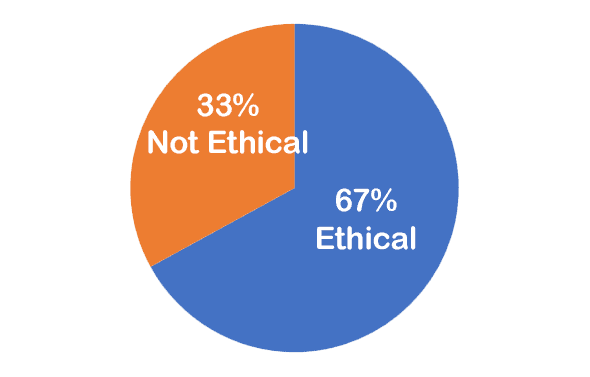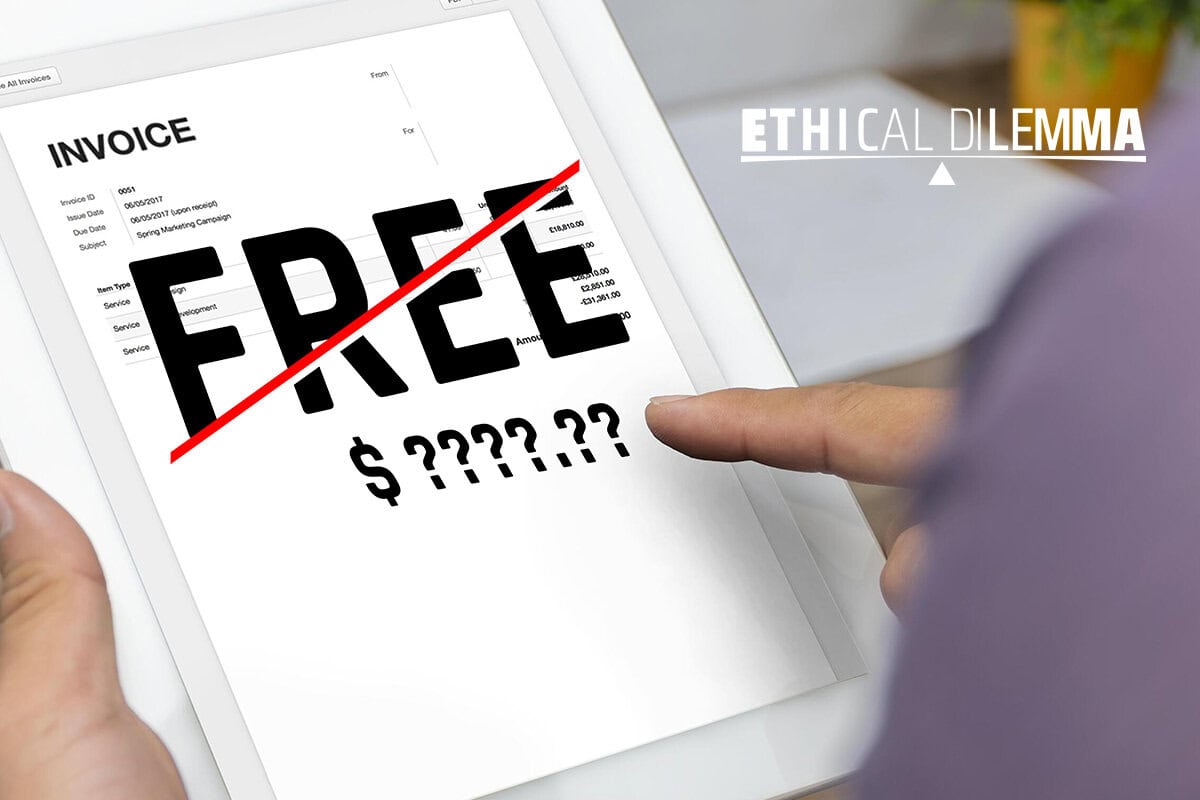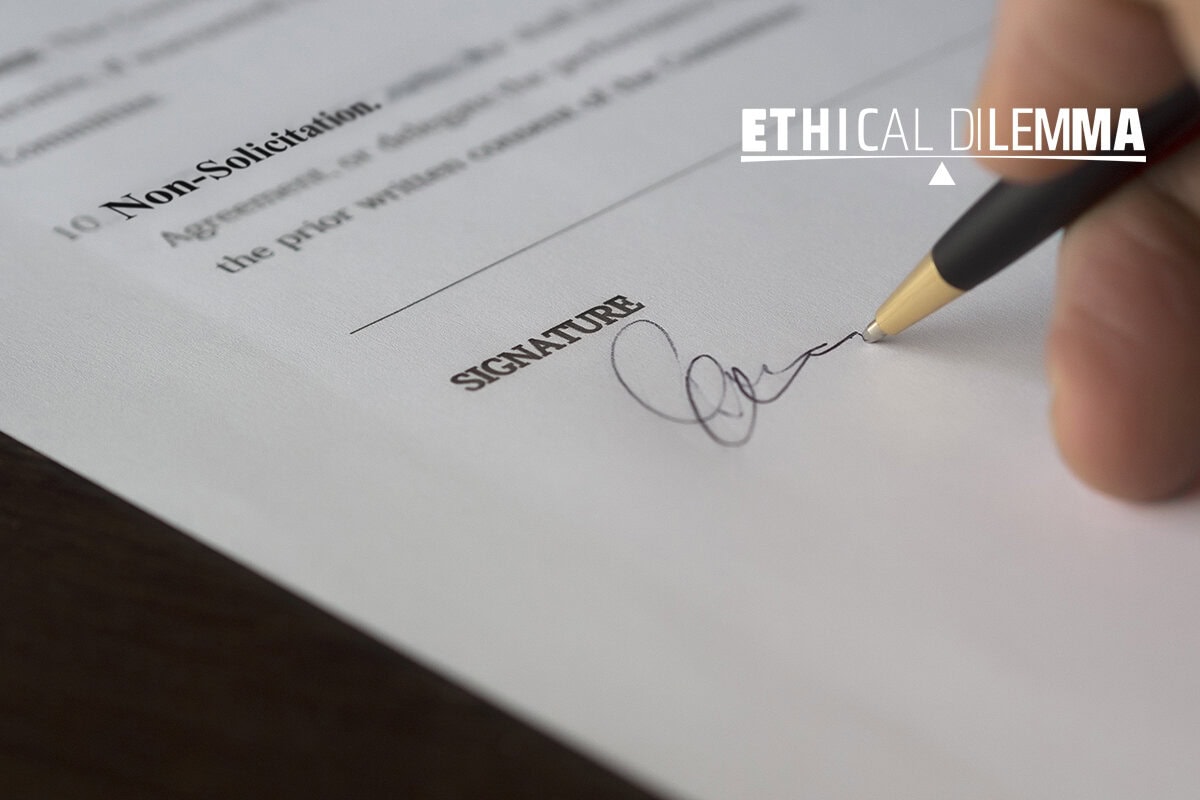This is the February 2023 edition of our monthly series of Ethics case studies titled What Do You Think? This series is comprised of case studies from NSPE archives, involving both real and hypothetical matters submitted by engineers, public officials and members of the public.
Your peers and the NSPE Board of Ethical Review have reviewed the facts of the case as shown below. And, here are the results.
Your opinion has been registered for the February 2023 edition of our monthly series of Ethics case studies titled What Do You Think?
Your vote is recorded as:

Want to know how your peers voted? We’ll send you an email with the poll results on February 28.
Your opinion has been registered for the February 2023 edition of our monthly series of Ethics case studies titled What Do You Think?
Your vote is recorded as:

Want to know how your peers voted? We’ll send you an email with the poll results on February 28.
A Review of the Facts
A village board made known its interest in receiving what it called “proposals” in connection to a contemplated water project, with an estimated construction cost of $500,000, to be financed in part with funds under a federal-aid program.
Three engineering firms submitted so-called proposals, one of which (from Firm A) included a pre-application study for submission to the federal agency, including a feasibility study, a general system layout, and a cost estimate. The other firms submitted less detailed proposals that primarily focused on the background, experience, and qualification of their firms for the project.
The proposal from Firm A was accepted by the village board on the basis of Firm A’s condition that it would be given a letter of intent for the work, stating that if the village secures the financing and proceeds with the project, a contract will be negotiated with Firm A, but otherwise, Firm A would not be entitled to any fee or other payment.
The other two firms have protested that the proposal by Firm A was unethical as constituting free engineering or a contingency contract.
Was it ethical for Firm A to submit a contingent contract proposal, including the type of technical data stated in the facts?
Here is the result of our survey of your peers:

Applicable NSPE Code References:
Code III.6.a
Engineers shall not request, propose, or accept a commission on a contingent basis under circumstances in which their judgment may be compromised.
Discussion
We will first examine the allegation that the proposal by Firm A constituted an improper offer of free engineering, contrary to the Code of Ethics. At the time the facts of this case developed, the Code contained a rule against free engineering, except for civic, charitable, religious, or eleemosynary nonprofit organizations, and only when such professional services were advisory in nature.
In January 1981, however, the NSPE Board of Directors adopted the present Code in a revised format to be consistent with the development of a proposed “uniform” Code of Ethics for the engineering profession and, at the same time, deleted the rule on free engineering. We deal with cases based upon the Code of Ethics as it stands at the time of our deliberations, and thus we need not consider the case before us on the basis of whether the facts would or would not come within the proscription as to free engineering services.
We are not constrained to limit the application of the Code of Ethics to points raised by those submitting the information and can therefore treat this case under a related Code reference, as cited. The provision on contingent contracts was revised at the time of the adoption of the present Code by deleting the previous clause to the effect that a contingency provision may not be used as a means of promoting a professional assignment.
Thus, the controlling question as the Code wording now stands is whether Firm A’s proposal, including the technical data described, was in circumstances that might compromise the professional judgment of the firm. Put another way, was it likely that the feasibility study, general system layout, and cost estimate as part of the proposal might have been influenced in favor of going ahead with the project in order that the firm would secure the professional commission?
We treated a similar question in an earlier case under a then-existing federal advance planning program in which an engineer assisted a community in preparing an application by furnishing preliminary technical data (Case 65-14). We concluded in that case that the degree of engineering data was not of a magnitude to conclude that it would conflict with the duty of the engineer to “prevent situations in which the engineer’s judgment may be influenced during the course of his preliminary studies to produce a favorable finding that will result in his being retained for the full project.” That conclusion was distinguished from a different result in Case 64-5, in which it was held that the engineer had crossed the ethical line in providing on a contingent basis field investigations and studies as required for the issuance of bonds to finance the project.
As noted in Case 65-14, the guiding principle in cases of this kind is that ” . . . the engineer must be careful not to include such degree of engineering service or opinions or conclusions on the economic and technical feasibility of the project that he would run afoul of the restrictions imposed by [the Code of Ethics].”
Although commonly used in the profession and by prospective clients, the use of the word “proposals” from firms competing for selection for a project has never been entirely clear. In practice, under regular selection procedures such as the federal (Brooks) law and similar state laws, the proposal is actually a statement of background and qualification of the firm for the particular project. And a proposal, in its more meaningful sense, occurs when the selected firm negotiates the details of the agreement with the client.
In that sense, Firm A went beyond the presentation of its qualifications and sought to influence the village by volunteering certain technical data to show its interest and desire for the project assignment by including certain preliminary information about how it would see the project’s development. In short, Firm A was more aggressive than the other firms in going after the work.
Whether in its aggressiveness, Firm A went beyond the criteria set out above to the point of allowing its interest to overlap with its independent professional judgment depends upon the extent, nature, and degree of the technical data furnished with the proposal. We cannot be certain on that point without a detailed examination of the technical data themselves, which is beyond our procedures.
In this set of facts, it would appear that the engineering data were of such detail that Firm A necessarily had reached engineering conclusions as to the feasibility of the project. It follows that Firm A has placed itself in a position of commitment and can no longer be impartial with regard to the future analysis of the client’s interest in proceeding or not proceeding with the project.
The Ethical Review Board’s Conclusion

It was not ethical for Firm A to submit a contingent contract proposal, including the type of technical data stated in the facts.
BOARD OF ETHICAL REVIEW
Louis A. Bacon, P.E., Robert R. Evans, P.E., James G. Johnstone, P.E., Lawrence E. Jones, P.E., Robert H. Perrine, P.E., Alfred H. Samborn, P.E., F. Wendell Beard, P.E., Chairman
Note – In regard to the question of application of the Code to corporations vis-a-vis real persons, business form or type should not negate nor influence conformance of individuals to the Code. The Code deals with professional services, which services must be performed by real persons. Real persons in turn establish and implement policies within business structures. The Code is clearly written to apply to the Engineer and it is incumbent on a member of NSPE to endeavor to live up to its provisions. This applies to all pertinent sections of the Code. This opinion is based on data submitted to the Board of Ethical Review and does not necessarily represent all of the pertinent facts when applied to a specific case. This opinion is for educational purposes only and should not be construed as expressing any opinion on the ethics of specific individuals. This opinion may be reprinted without further permission, provided that this statement is included before or after the text of the case.









In my reading of the facts I didn’t see anything unethical. As the discussion pointed out, Firm A was more aggressive. However, they did it at risk. In the statement: “The proposal from Firm A was accepted by the village board on the basis of Firm A’s condition that it would be given a letter of intent for the work, stating that if the village secures the financing and proceeds with the project, a contract will be negotiated with Firm A, but otherwise, Firm A would not be entitled to any fee or other payment.” I read that the village reviewed all three proposals and chose Firm A. After choosing Firm A they provided a letter of intent and presumably also letters of no intent to the other firms. In my experience with both public and private projects that is not uncommon since funding isn’t always secured until after intent/award. Once funding is aligned it is understood that Firm A would get a contract, and if no funding is secured then Firm A receives nothing and there is no project.
I usually come to the same conclusion as the Board just using “common sense,” but I have to admit that I do not understand this case (or the applicable part of the Code of Ethics) at all. Having put out “requests for proposals” (RFP) for technical work and received such proposals from competing firms, I do not understand how useful a simple statement of the firm’s capabilities would be. My RFP’s described the task to be provided and requested, from the firms, proposed scope, approach, and cost – whether the contract was to be “time and materials” or “fixed cost.” Yes, resumes of the proposed individuals to perform the work were included and reviewed when deciding which firm to hire, but the technical aspects were also very important. Maybe someone can explain what this part of the Code of Ethics is trying to do. Thanks!
Was this not done at Firm A’s risk? Nothing said that the Village Board could not select one of the other firms. Although it sounds like a lot of work was done that Firm A might ultimately have done for nothing, the practice of providing some “preliminary” or “conceptual” solutions is not uncommon. It is seen by some as another way to demonstrate the firms experience and expertise.
Clearly this was done in an effort to impress those tasked with selecting the winning firm, and it appears to have worked, but it wasn’t so much “free engineering” as it was, “Hey, look how eager and smart we are.”
I disagree. It is the responsibility of the engineer to provide sufficient detail in any proposal to indicate to the client just what they are getting into and what type of decisions and actions they will be expected to understand and undertake in executing any contract.
My impression is the plaintiffs were crying foul because they did not put forth sufficient effort to develop the proposal called for by the client. This rule gives less than professional proposals a new lease on life and leaves potential clients in limbo as to what they can in soliciting proposals.
The suit should have been thrown out.
I strongly disagree. Firm A may well have done a considerable amount of free work to convince themselves this was a viable project before submitting their proposal. The contingent nature of the proposal was a perfectly legitimate proposal which the town could have disputed or refused. Calling this unethical leads firms to submit vague proposal and forces organizations to make decisions based on reputation not facts. A truly bad call by the group. If I were Firm A I would sue before accepting this blatantly bad a decision and I thing the board would have real trouble defending themselves. In effect the other firms said “they can’t get the project because they did more work then us”.
I agree with the above disagreements. Nothing was presented to indicate unethical behavior by the responding Company A. The intent of the municipality was decided to proceed with the project; they were looking for a firm that would provide them with the expertise to carry it forward. Company A showed their expertise without prior commitment or enticement.
I’m afraid I have to disagree with the Conclusion of the Board. Where is the rub in saying you will negotiate if the money is available and you do the work beforehand? With the risk of not winning the contract? This is an open process by a public agency. Competition in the design using qualified people for the current project is what wins. Past performance, knowledge, and skill presentation are supplemental to the decision of who is going to solve my problem.
I get the impression that the call for proposals did not disallow the level of detail submitted by company A. Submitting a more detailed proposal shows a better understanding of the project and higher level of commitment. I don’t see anything unethical about that.
I agree with the above disagreements! I have nothing more to add that has not already been said, plus I might get called “unethical” for providing too much detail! (That was a joke!)
It sure sounds like the code was written with an eye towards “protecting” the engineering profession. Not allowing “free services” to be offered would seem to limit the usefulness of submitted proposals.
In their offering of “free” services, Firm A was able to demonstrate their competence in some particular areas of the project, and likely reduce anxiety in how to do parts of the project that were likely unfamiliar to them.
I’m all for ensuring engineering competence and professionalism. I’m against the protectionist racket that many professional organizations keep pushing. To wit: Pharmacy, Physician Assistant, Occupational Therapy, Physical Therapy all used to be bachelors degrees. Now they’re all graduate degrees. Is the public better served? Probably, but not by much. Seems like a way of limiting providers in order to raise fees.
“…it would appear that the engineering data were of such detail that Firm A necessarily had reached engineering conclusions as to the feasibility of the project. It follows that Firm A has placed itself in a position of commitment and can no longer be impartial…”
I’m sorry, I don’t see how that “follows”. Clearly Firm A was anxious to perform the work. However, to assume that their desire for the project will over-ride their professional judgement seems to me to be a bridge too far.
The board has decided that the firm will not be impartial and professional, and therefore finds the firm is impartial and unprofessional. That is unfair to say the least.
I disagree also. This appears to be a request for qualifications, i.e., it is a qualification-based selection process. Firm A demonstrated their qualifications by performing the preliminary studies to illustrate their experience and knowledge of the proposed project. The cost estimate was for construction costs, not professional services. The expense to perform those preliminary studies was a risk they assumed in an attempt to win the project.
As a design engineer, I have put together cost proposals for both my management and other firms when developing and designing facilities. These proposals included costs, a base layout, a schedule of tooling/equipment and timeline for completion. For me, when looking a suppliers and contractors for the projects, I always looked for these same things in their proposals to me. I find NOTHING wrong with what Firm A did and would likely hire them over the protests of the other firms sour grapes.
I said ethical based on the limited facts given. I assume ,but could be wrong, that there were requirements given to the proposers as to the content of the proposal. So either the other two firms submitted un-responsive proposals or Firm A’s proposal went beyond the requirements. I think the pricing aspect would be a separate submittal after the firm was selected., but if the instructions to the proposers wasn’t clear, I think they have a legitimate protest.
Engineering services are not to be low-bid as is construction. Selection of firms for services is to be via a QBS (Qualifications-based Selection) process, per the federal Brooks Act. This is especially true if the municipality is using Federal Funds. The municipality should have issued a ‘Request for Qualifications’, not a ‘Request for Proposals’. Firm A gave the municipality exactly what they asked for — a proposal. But the village asked the wrong question to begin with. Unless the Village intended to follow a best-value procurement (e.g., Design-Build, which includes qualifications/technical score and dollars), dollars (i.e. cost of engineer’s fee) should not have played into the Village’s decision (if they were in agreement with the Brooks Act). If the Village is using Federal dollars and they are not in compliance with the Brooks Act, they could lose that funding. I think that is where the issue should start.
I agree with the Board. Presenting a design direction that is specific enough to provide a cost estimate in the proposal stage is likely presenting an engineering solution before the problem has been fully understood. It is likely counter to the client’s best interest for Firm A to prematurely present an answer, even a preliminary one, before gathering all the information needed. It feels more like a strategy to differentiate themselves from the other proposers, and that may be at the client’s expense. Firm A, if selected, may feel pressure to follow a design direction that was half-baked, and is therefore compromised. Also, I wonder if, since the project is getting federal aid, does the Brooks Act need to be followed? If so, the initial selection shall be based on qualifications only, to be followed by a negotiation phase. The free service offered by Firm A goes beyond qualifications, and could be viewed a fee-related proposal.
Given the fact that this was a federally funded project, if you hired Firm A and the other firms protested to FHWA, you could end up in court and probably convicted. Federal law requires Qualifications Based Selection which this was not given the fact that Firm A included their cost estimate.
One thing that seems forgotten in the original assessment and all comments above is the customer.
It seems to me that their interests should be first and foremost. Not the interests of the disgruntled competing firms.
You want more consideration in the future? Offer more value.
I do not agree that this was unethical. Essentially, they provided the village board with preliminary engineering documents at risk — the board could have gone ahead used the information to secure funding without necessarily awarding the contract to firm A — but they took that risk, presumably with the hope that the board would recognize and reward their diligence in doing the advance work that would assist the board with securing funding. Nothing in this story — as presented — said that the engineering retained the rights to work product in the proposal. There are instances where proposals contain confidential and proprietary information that an agency cannot disclose, such as financial details. There’s no mention of that here. Basically, they said, if you award us the contract, and don’t get the grant, then no harm-no foul, you owe us nothing for what we’ve done. But there’s no mention that they sought to retain the rights to the preliminary work product provided. And if their preliminary work supported the project, I don’t see how their judgement would be compromised later on. If awarded the work, they still need to design a solution that is workable, and sign and seal it.
I voted ethical, but I am going to go against my vote and buck the trend of most comments. It seems to me that the “free engineering” that the other firms complained about is not the issue. Instead, the issue is that Firm A has now committed resources that it can only recover if the village is awarded the funding. Therefore, if Firm A is hired, they will be driven not by the correct technical solution, which may be to not proceed with the project, but by the desire for the project to proceed at all costs so they can be paid for the work already performed while generating the proposal.
If Firm A were hired under the given circumstances but had no input into the decision to proceed with the project, then I think the practice would have been ethical. This is the type of proposal I often work on. The project path and go out no-go is decided by an outside party. Either another engineering firm or the potential customers own people.
A lot of design firms work without fee on similar agreements while submitting for Design-Build RFPs, even for the government projects. This is very similar to that situation. Providing detailed response to the RFP shows the firm A’s clear understanding of the scope and willingness to take a calculated risk, which we all do as part of doing business. Firm A did not bribe anyone or bring any political pressure to win this project. There is nothing unethical about it.
Robert, well said. It wasn’t Firm A’s fault that the town asked for a proposal when they wanted just qualifications. If they only needed qualifications, that is what should have been asked for.
So the unethical part was including a cost estimate? A Qualifications Based Selection wasn’t requested. A proposal was requested by the town and Firm A provided one.
Personally I don’t see anything unethical in their tactics. They are demonstrating that they are familiar with Procedures, Codes and requirements in the area. They are demonstrating that they are acting in the best interest of the client, this in itself may influence the client but isn’t that the intent of a proposal? There is nothing mentioned about recovering the costs that they have expended in pursuing the project.
I also disagree with the Board’s conclusion. Providing the prospective client with all relevant information necessary for their decision is in the best interest of all parties.